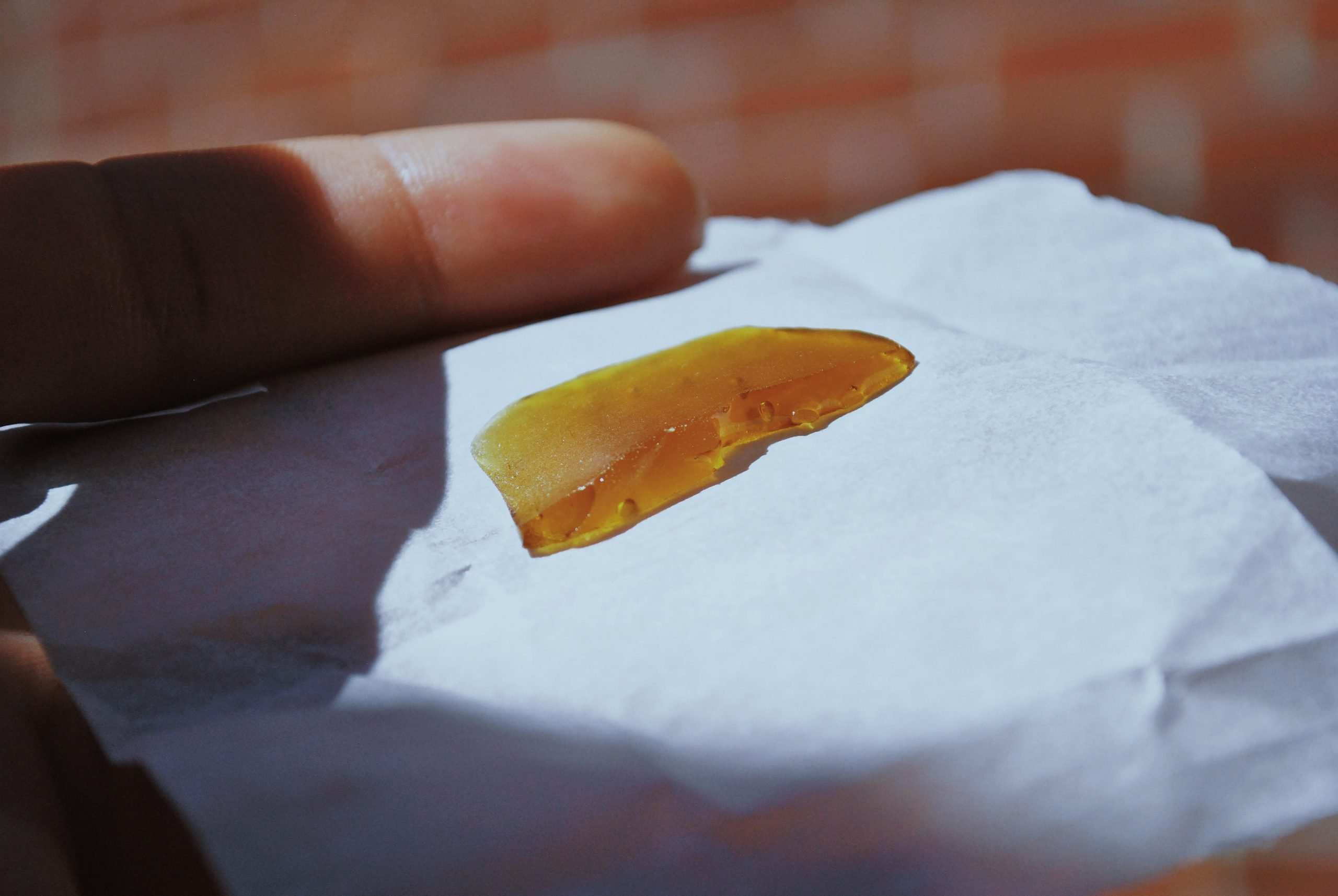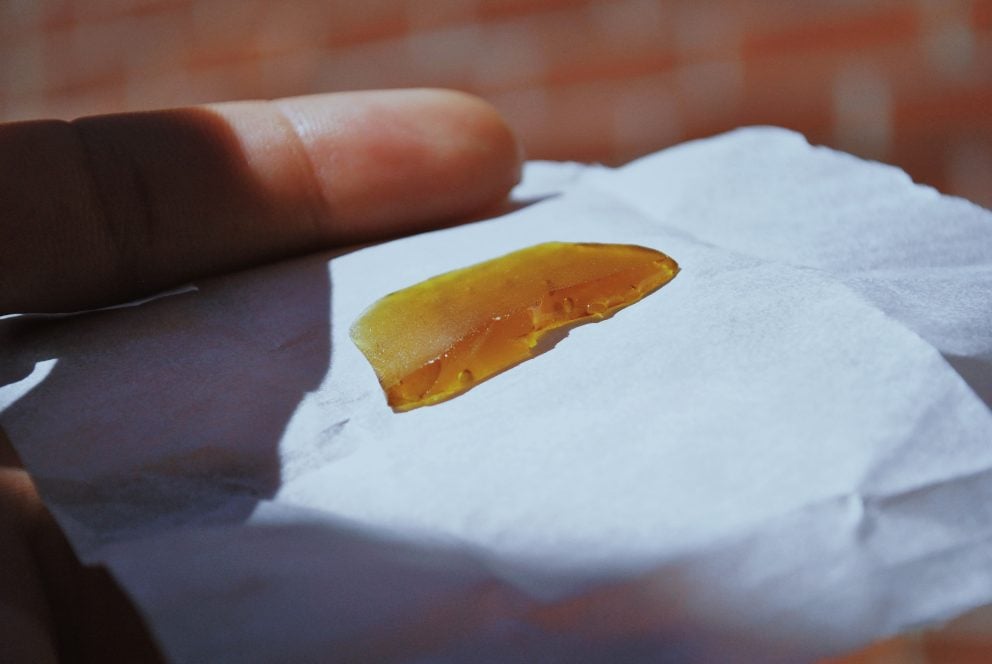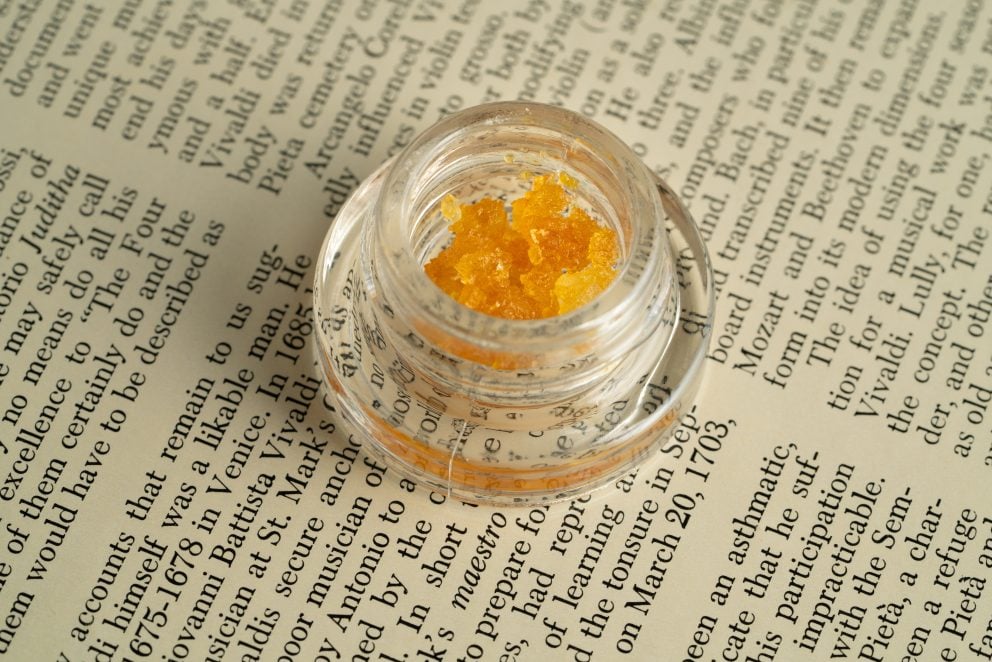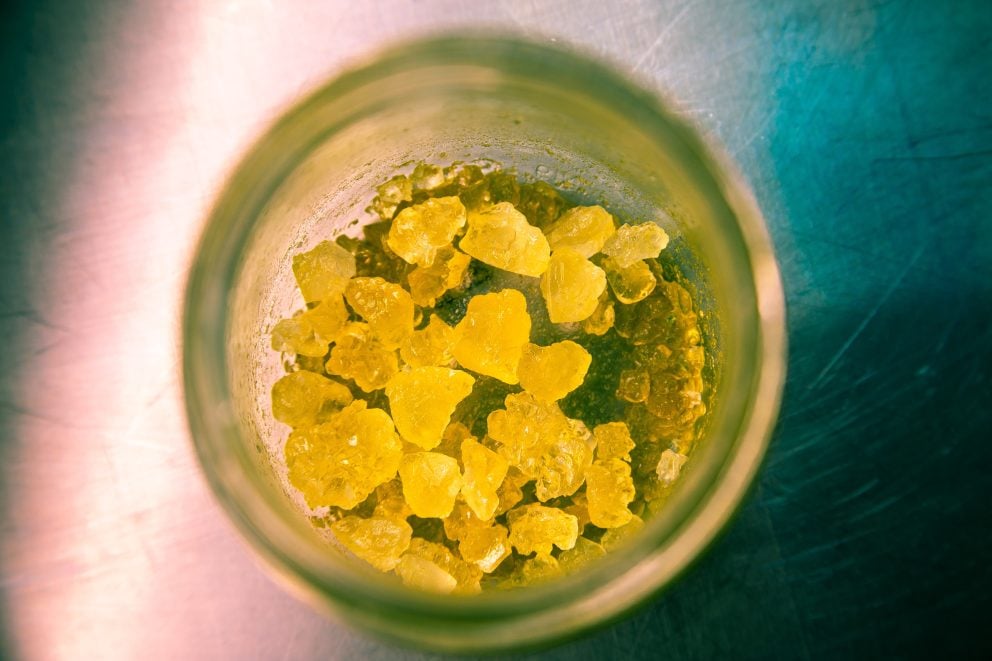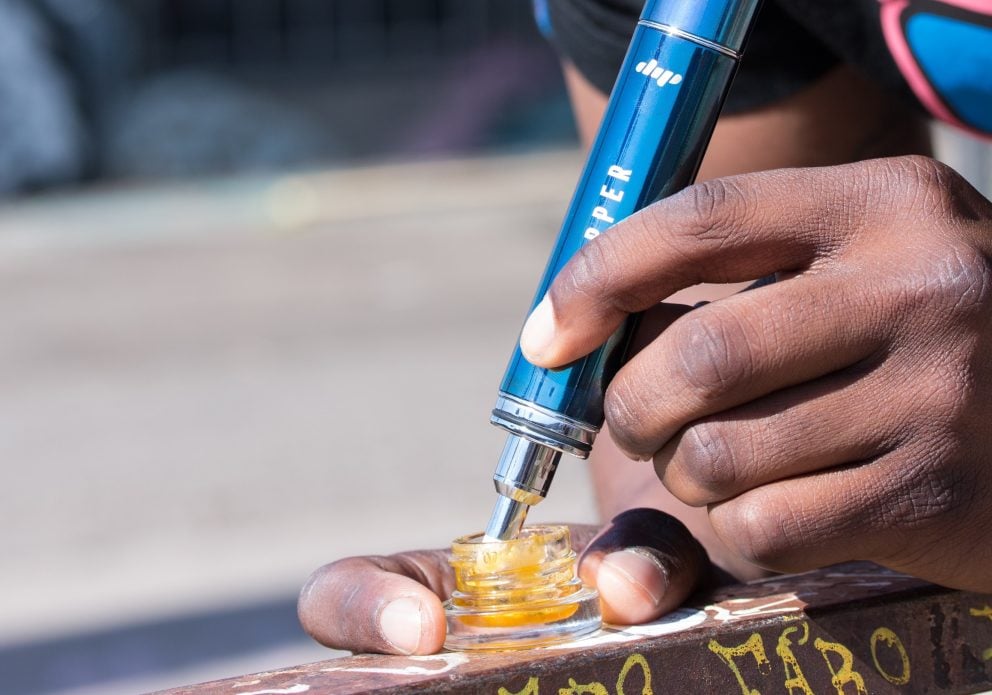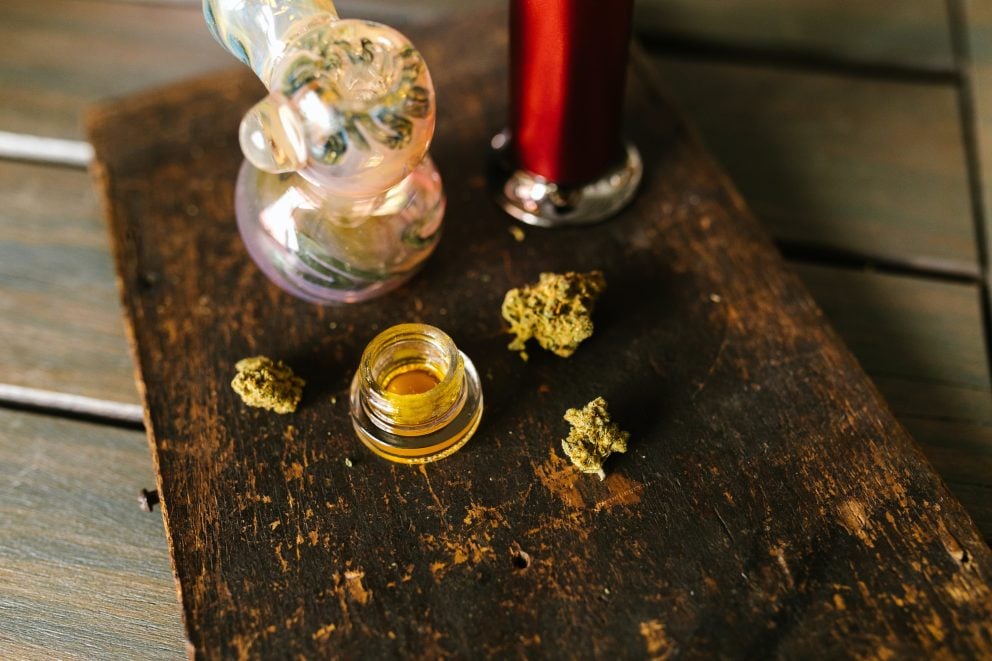
Photo by RDNE Stock Project
There is a pretty steep learning curve for the world of cannabis concentrates. Some products, especially dabs, can be pretty niche and have confusing names. The average patient new to cannabis may not be fully aware of the benefits of these products or even how they’re made.
It can be easy to feel lost in the sauce with all of the specific terminology and no one wants to walk into a dispensary with no idea of what they’re looking for. There’s a whole world of concentrates including resin, rosin, shatter and wax.
In this article, we’ll break down the basics and discuss the differences between shatter, wax, and crumble to get you up to speed so you can smoke responsibly.
Cannabis Extracts: A Primer
To get higher highs while retaining as many of the plant chemicals (phytochemicals) and antioxidants naturally found in cannabis, various extraction processed has been developed to harvest a host of cannabis concentrates like:
Many of these extracts are used for dabbing which can be one of the most potent ways to consume cannabis. The various processes used to cultivate these can vary and are good to understand so that you can make an educated decision on how you consume them.
The goal is often higher highs while for some it is to preserve as many of the phytochemicals as possible. After all, we have an entire endocannabinoid system that’s influenced by the various compounds in cannabis. Many of these have health benefits which is the main driving force of both medical marijuana and cannabis legalization efforts.
Many of these concentrates are cultivated either from cannabis flower, the remains of cannabis i.e. shake which is left over after trimming cannabis, or hash. Hash is often much more concentrated than standard cannabis because it mostly includes trichomes which are the plant’s factories of cannabinoids and other phytochemicals.
[fl_builder_insert_layout id=13138]
What Is Shatter?
Shatter is a solid cannabis extract that is named for its glass-like consistency. It’s pretty potent as it consists of mostly cannabinoids extracted from cannabis plant material or hash using solvents like butane or hexane to strip the cannabinoids from the plant matter.
Again, one of the major points of contention for medical marijuana is that if you smoke it you are exposing yourself to carcinogens. States like Pennsylvania which have legalized medical marijuana maintain it’s still illegal to smoke weed.
Blasting cannabis or hash with these solvents leaves behind pure cannabinoids like THC and CBD. With shatter the resulting product is a transparent, amber-colored slab that breaks apart like glass or gets “shattered.” It has a smooth texture and generally tends to be less sticky than other cannabis extracts like butane hash oil.
Shatter can contain up to 90% THC, delivering a fast-acting, intense high when dabbed or vaporized. Given the texture it’s more likely to be used in dabs rather than incorporated into other cannabis products.
Photo by Cambridge Jenkins
What Does Shatter Look Like?
Shatter is semi-transparent and glassy and is often sold as shard-like pieces. Unlike other extracts it tends to break rather than bend or appear waxy or soft. It can have amber coloring and look light gold to a dark rich amber color.
It can vaguely resemble rock or hard candies and have a smooth texture and even have sugar-like granules. The texture will vary depending on if it has more lipids, moisture, or fats. After all, many cannabinoids and phytochemicals are oil-soluble. This is often what dictates the various textures of cannabis extracts.
Higher quality shatter snaps cleanly and is not sticky or bendable. Again, given its low moisture content it tends to be brittle and resembles caramelized sugar.
What Is THC Wax?
THC wax, or cannabis wax, refers to softer cannabis extracts that have a wax-like texture or consistency. Wax is extracted similarly to shatter and butane hash oil which uses solvents like hexane or butane to isolate cannabinoids and separate them from the cannabis plant material.
They’re blasted with these chemicals which bond and then seep from the plant material. Then the remainder is treated to remove any chemical remnants.
The main difference in the wax production process is that it can tend to include more moisture and fats from the marijuana plant which are part of why they take on the waxy texture.
In the realm of wax there are a few different products and names like budder, which can have a more scoopable consistency, and crumble, which is named for its drier crumbly texture. Wax tends to be slightly less potent than shatter, because it is less a dense collection of cannabinoids and has more fats.
THC wax can often end up being between 40-80% THC. In addition to its intense high it’s noted for aroma and flavor. The high potency of wax dabs is a cause of concern, while THC cannot cause a deadly overdose there is the potential for cannabis-induced psychosis.
Wax is commonly used for dabbing however it can be eaten, rolled into small balls, and some addiction centers warn that it can be used in the form of lip balm.
Photo by Nick Harsell
What Does Wax Look Like?
Again, wax can vary in its texture depending on how refined it is and the general breakdown of lipids fats and terpenes. It generally will look waxy ranging from the consistency of earwax to a slightly oilier version of candle wax.
The coloring of THC wax can vary from a slight yellow to a richer dark brown. It can also have a rather earthy scent as it retains many of the terpenes. It will not be as heavy of a scent as cannabis flower but can have a fruity, piney, or even nutty scent depending on its terpene content.
Products named budder can be on the creamier side named for everyone’s favorite dairy ingredient. Standard wax can be stickier or more tacky. There’s even a form of cannabis wax called honeycomb which can vaguely resemble the bee’s nest building material with its web-like formation. There’s even a form called crumble.
What Is Crumble?
Crumble is a cannabis concentrate under the wax umbrella. It’s named for its crumbly texture and as it tends to crumble when handled. It’s made using solvents to extract cannabinoids and other cannabis phytochemicals from the cannabis plant material and then treated to purge the concentrate of solvents and moisture.
The secret to crumble is lower heat and longer vacuuming time to remove the solvents. This saps more of the moisture and gives it the drier consistency. The result is a brittle waxy product that’s rich in cannabinoids and terpenes like myrcene and caryophyllene.
Crumble typically contains around 60-70% THC but it can be as high as 90% in some cases. It’s dried out, crumbly texture makes it easy to sprinkle onto bowls or parse out for dabbing.
Photo by Jeff W
What Does Crumble Look Like?
Crumble can look like an off-yellow or golden-brown feta cheese. It can also look like dried fresh honeycomb. It breaks apart easily when handled into smaller crumbs or chunks and has a drier consistency than other concentrates.
Depending on how it’s made it may even have some green cannabis bits. It can be slightly matte unlike oilier wax products. If your crumble is sticky that may point to moisture or a decrease in potency. After all, cannabis products can go bad as heat and light can cause the degradation of cannabinoids.
Shatter Vs Wax
When it comes to shatter vs wax, the main differences boil down to texture, consistency, and potency. Shatter by virtue of its crystalline makeup tends to be more dense with THC as many of the fats and lipids have been removed.
These fats and lipids are what give wax its wax-like texture. This also makes wax more pliable so it is easier to dose as it can break apart into different sized pieces while shatter must be broken and potentially create inconsistent dosages.
Both can be used for dabs and/or incorporated into smoking bowls or even added to joints.
Differences Between Wax And Shatter
The most apparent difference between wax and shatter is their appearance. Wax can be soft and waxy. It is more opaque and can come in shades of yellow, green, or gold. This soft nature is due to it retaining more of the fats which include terpenes so when smoking wax it can have more of a scent and flavor.
Shatter tends to be glasslike and appear like rock candy. It is often in the amber color spectrum and more translucent. It tends to be more potent as much of the THC is retained while eliminating many of the other chemicals and plant matter. Remember, that pure THC can hit differently as the entourage effect tends to balance out your high.
Shatter can be easier to handle for dabbing as the waxy consistency can make it hard to negotiate getting wax onto your dab apparatus whereas you can handle shatter more easily with your hands.
Shatter also has removed most of the moisture which ensures it has a longer shelf life than wax.
Photo by Dip Devices
Shatter Vs Wax Vs Crumble
What happens when you add crumble to the mix? While shatter is glassy and translucent it’s also dry and crumble tends to be more like wax but with much of the moisture removed. This makes them both easier to handle and dose your dabs.
Shatter is the most potent while crumble can be less potent than shatter but more than wax. Wax tends to have the lowest potency of the three likely due to retaining more of the other phytochemicals. This also means that wax can tend to be more robust and flavorful as it’s kept most of its terpenes.
Of all three, shatter tends to have the longest shelf-life given its chemical makeup. Its lack of terpenes also lends to it being a more discrete smoke and drawing less attention while still allowing you to enjoy THC.
Final Thoughts
Necessity may be the mother of invention but so are higher highs. Cannabis enthusiasts have invented a whole collection of concentrates that offer different experiences, flavor profiles, and uses.
While the names can feel pretty niche there has been a lot of thought and ingenuity to find a way to more readily expose you to valuable compounds in cannabis that can help you heal. Whether you want THC, a collection of terpenes or some more antioxidants these various products can get you there.
If you’d like to get your medical marijuana card, why not start with Green Health Docs which offers you a more simplified process to get your medical marijuana card easily today.

